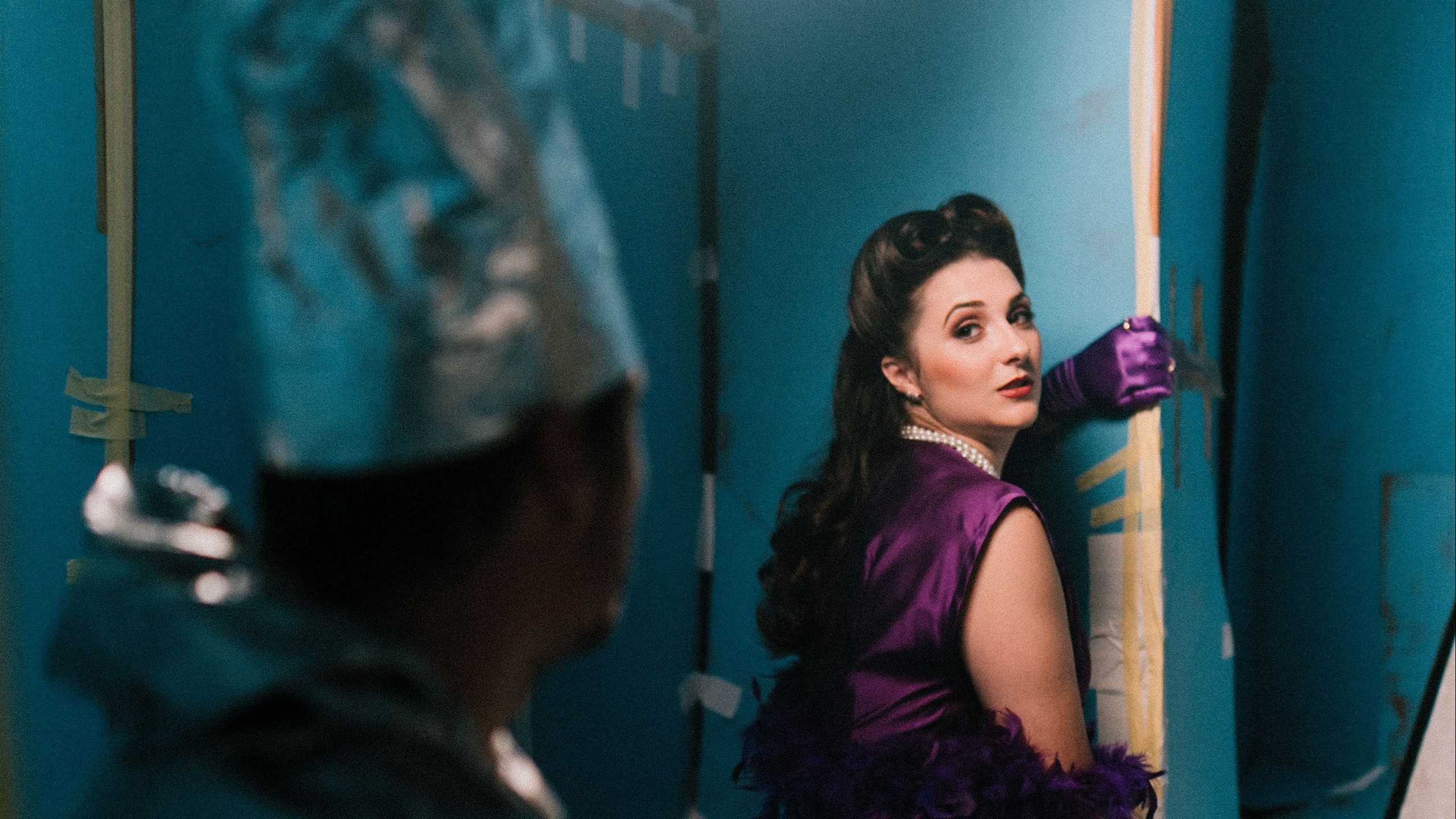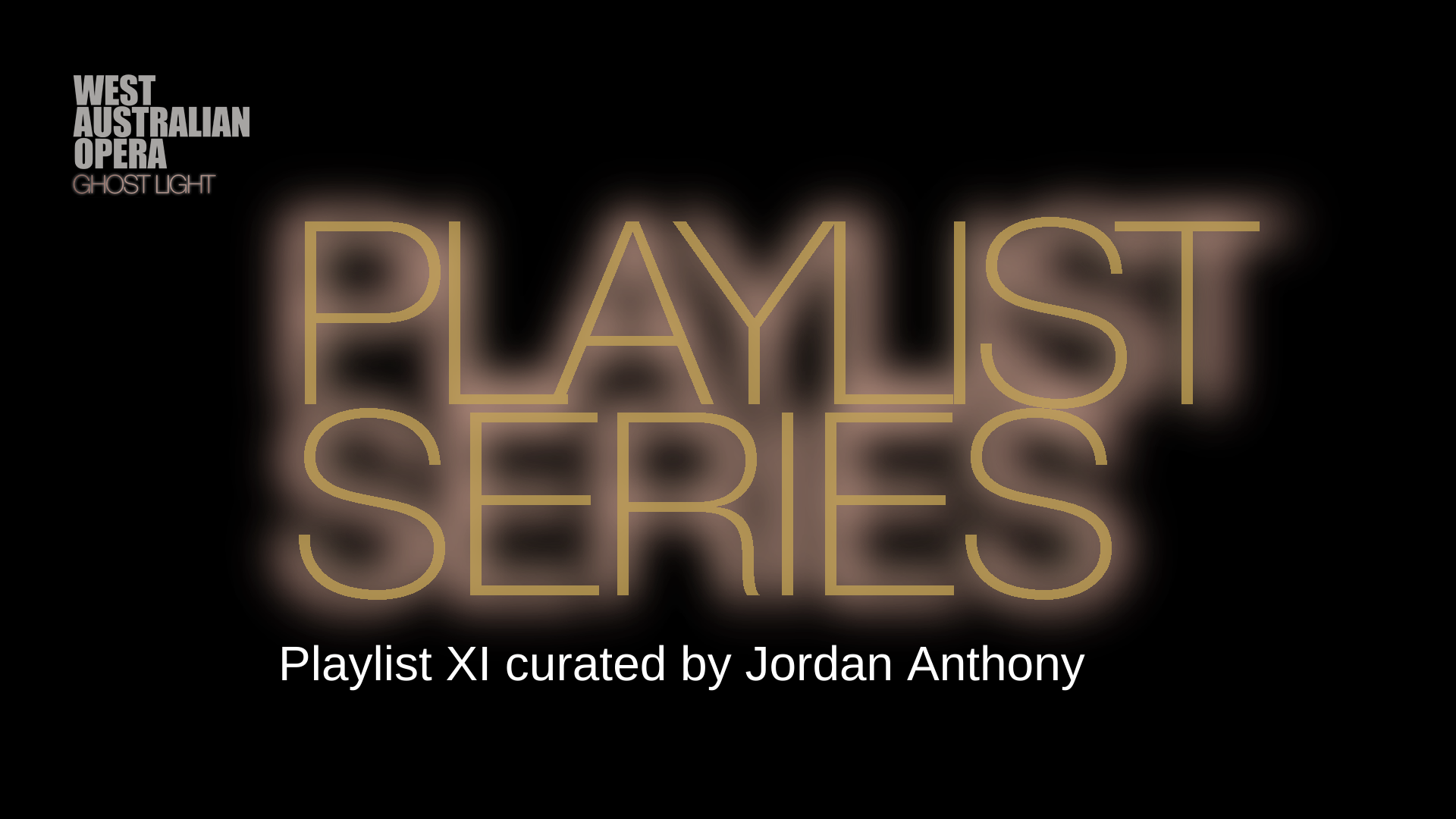WAO Ghost Spotlight with Chelsea Burns
Until our artists can fill the theatre halls with beautiful opera once more, we are creating exciting new spaces for them to engage virtual audiences. As we adapt to this changing environment, we want to shine a spotlight on our creatives working in the Ghost Light to bring the magic of opera from our homes to yours. Connect with your state opera company on an intimate level and learn why this period calls for motivation, stimulation and reinvention.
This week, hear from Wesfarmers Arts Young Artist Chelsea Burns on her experience performing The Telephone, the differences between rehearsing for film and live opera, and her diverse listening choices to suit every quarantine mood.
1. Tell us about the rehearsal and filming process for The Telephone – how does it compare to performances on stage?
Rehearsing and filming this production was a very exciting and new process for me. Normally you have quite a few weeks to experiment with the director, music director, and your fellow performers to collaborate and create the best final product that is eventually placed before your audience. There is a huge feel of fluidity and freedom throughout the process for things to evolve and change depending on everyone else’s interpretation. Although that was definitely still present during this process, our rehearsal period was much shorter than others I have previously worked within so there wasn’t as much time to play and experiment with the characters. This resulted in a lot of my character work being thought about outside of the rehearsal room after conversations with Katt (the director), Chris (the music director), and Lachlann (Ben, as well as my partner) so as not to waste the precious rehearsal time that we did have.
Something else that was an interesting added element was the awareness of having a ‘final product’. When performing live, something is bound to be different every night. Whether it be a great vocal performance one night, really delivering on the main aria the next, or being fully involved in the character on another, each night will be different from the other. It was therefore interesting to have to try and think about solidifying a final product. As all of us are constantly seeking this idea of perfection and thinking that we will ‘do it better next time’, it was actually quite liberating to realise that whatever you offered in that moment of filming was going to be the final product.
I thoroughly enjoyed the whole process of filming The Telephone. It was a completely new learning experience for me and I loved the challenge of it. Having to think about lighting angles on my face, continuity between takes, as well as filming scenes several times to get different angles is definitely not something we ever have to think about in live theatre. The entire team was so supportive and helped us through the whole time.
2. How important do you think it is to find new ways to perform opera during this time? What are the benefits to this unique experience?
I think it’s incredibly important to find new ways of performing opera, whether it be during this pandemic or otherwise. It truly upsets me that some people believe opera is no longer relevant and that it can sometimes be seen as elitist. I think opera is something that has the potential to engage anyone, whether it be because of the amazing singing, the story, the production, or just simply wanting to revel in beautiful music. Opportunities like this give people the chance to step outside the box we create for ourselves and come up with something they never thought of before. I, for example, never thought I would ever be involved with a fully filmed opera, but here we are! It is chances like this that let us reinvent the norm and potentially create something more remarkable than what was there before. Hopefully by doing this we can evoke a love of opera in people who may have otherwise never been given the chance.
3. What does working in the “ghost light” as a young artist mean for you? What does your day look like now?
Working in the “ghost light” for me has been very interesting. When the response to the pandemic first hit, myself along with basically everyone I know in the artistic field lost most of their work pretty much instantly. For a few weeks I felt quite desolate and didn’t really know what to do with all this free time I found thrust upon myself. It was hard to motivate myself to practice or to learn new things when I had nothing to work towards, but I eventually found myself back at the piano. It helped get me back on track when I was lucky enough to get this work on The Telephone and a few other gigs I have picked up during this time.
My days since The Telephone has finished are filled with organising what repertoire to learn next, getting myself back into a gym routine, sorting out my diary now that work is slowly starting to pick back up again, reading, and spending time with Lachlann. Things definitely aren’t back to normal yet, but they are slowly getting there.
4. What’s been the easiest adjustment during this time? And the hardest?
The easiest adjustment for me during this time was not being able to leave the house. Unlike Lachlann who is a typical extrovert and was going stir crazy, particularly without his gym, I’m always quite happy to find my own entertainment and settle in at home. The hardest adjustment was probably finding a reason to practice after losing all of my work so suddenly. Being a freelance artist means you always have to have a very strong ability to self motivate, but it is always easier to find that when you have something you’re working towards.
5. What have you learned about yourself during this period?
I have learned that I cannot trust myself to be left home alone all day with sweets in the house. They will not survive the day no matter how good I think my self control is.
6. What are you watching, reading, playing, singing or listening to as a reprieve?
I have been doing a few things to keep myself sane during this period. I’m an avid reader and I normally read between two and four books each week. I have a subscription to Kindle Unlimited so I have been finding different things on there to read, which not only saves my sanity but my bank account as well! My mum, dad, Lachlann, and I have also been enjoying doing puzzles together at nighttime.
I have quite a diverse taste in music and it definitely changes depending on my mood. During the quarantine period I have found myself listening to opera, art song, musical theatre, 80s hits, the best of Disney playlists, classic rock, jazz piano, punk and Billie Eilish, amongst so many others. I was lucky that my parents raised me listening to lots of different genres of music so I have many to draw upon depending on what my mood requires.
Something the young artists have done during this time is form a zoom Opera Book Club. One person picks an opera each week and we discuss it amongst each other and Chris. This has been a lot of fun and I’ve really enjoyed using it as a way of keeping in touch with everyone through this whole period.
7. What’s on top of your to-do list when this is all over?
At the top of my to-do list is probably reestablishing an everyday routine. At the moment everything feels uncertain because we’re so unsure what the next six months will bring for us, so I’m just excited to have some sense of normalcy to return to. I know that a lot of things may never be the same, but a huge part of our ability to function as performers has been impacted so greatly that it will be a relief to know we can perform as we once did.
ABOUT CHELSEA BURNS
Chelsea Burns is an Australian soprano and a current member of the Wesfarmers Arts Young Artist program at West Australian Opera. The role of Lucy in Menotti’s The Telephone marks her solo debut with the company.
She completed her Master of Music at the Royal Northern College of Music where she trained as a mezzo-soprano. Her stage credits at the RNCM include Carmen in a concert version of Bizet’s Carmen, Louise in Offenbach’s La vie Parisienne, and Didymus in Handel’s Theodora.
Over 2018, Chelsea was fortunate enough to work with Opera North in Leeds, UK. She shadowed the role of Kate Pinkerton in Puccini’s Madama Butterfly and was a part of their Chorus Mentorship Scheme.
Before moving to England, Chelsea attended the prestigious Western Australian Academy of Performing Arts. Her stage credits at WAAPA include the Witch in Humperdinck’s Hansel and Gretel, Marianna in Ricci’s La serva e l’ussero, Oberon in Britten’s A Midsummer Night’s Dream, and Cecilia March in Adamo’s Little Women.


